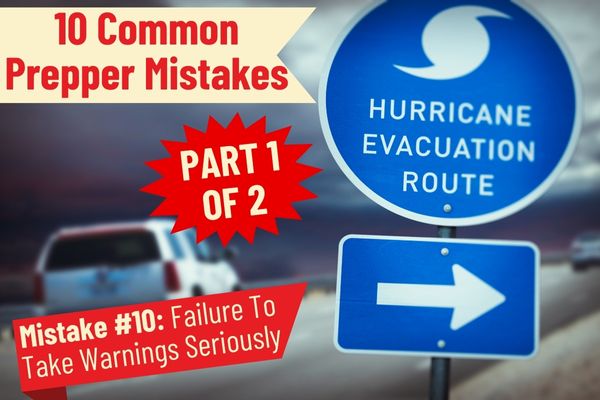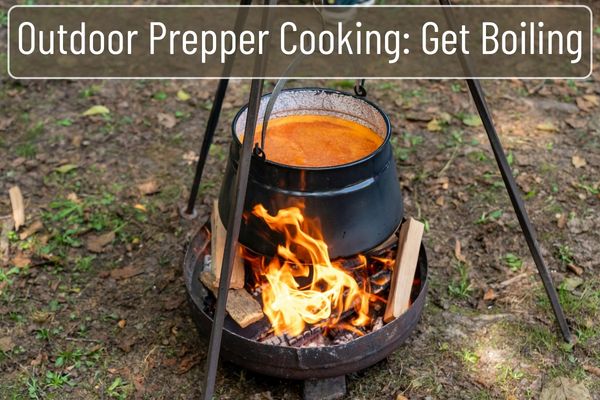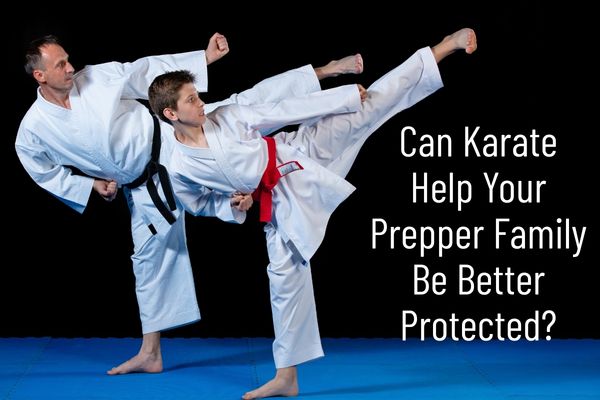There’s a good reason why you can find hundreds of books, apps, videos, and training courses for preppers.
It’s because even the most seasoned preppers that seem to be doing everything right can inadvertently make critical mistakes.
You see, prepping is more than just storing away food and gathering bugout essentials. It’s a well-thought out plan for survival that continually feeds a prepper’s confidence. And even the most minimal mistake can have a huge impact when faced with a disaster scenario.
Rather than wait until it’s too late, it’s always a smart idea to anticipate every catastrophic scenario and plan accordingly. Remember, mistakes can be avoided with proper planning.
Here are 10 common mistakes that even seasoned preppers make:
<1> Mistake: Packing Too Much in a Bugout Bag
There are a variety of scenarios where a bugout bag may be necessary. Whether it’s a result of natural disasters like hurricanes, floods, wildfires, earthquakes, or perhaps a threat of war, the impact on your safety could escalate and you’ll need to grab your prepped and ready bugout bag.
In some cases, a bugout bag may have been packed months or years before ever needing to use it. And perhaps your first inclination was to stuff the bugout bag to the brim with everything and anything you thought you’d need. But consider the fact that you may have overpacked the bag. Also consider that you may need to carry your bugout bag for many miles on foot. What’s the benefit of a bugout bag if it’s too heavy and cumbersome to carry? The time to evaluate whether you made the mistake of packing a bugout bag that is too full to carry is not the day when an unexpected disaster strikes.
To keep the bugout bag as light as possible yet still hold critical essentials, make a prepper essentials list. That way, you’ll carry your bugout bag easier and be more confident that you have the necessary supplies for bugging out.
<2> Mistake: Buying Prepper Gear, But Not Gaining The Critical Skills to Use Them
You’ve got the right prepper gear. Great! But having the right equipment and gear is not enough … you must know how to use it. For example, you may have bought the recommended water filtration and purification systems but when disaster strikes you realize that you never even took the systems out of the packaging. It’s a critical mistake to wait on using the skills and gear you’ll need during an emergency.
Also imagine that you’re needed to administer first aid. You grab your fully stocked first aid kit only to realize you decided against taking a basic first aid training.
Ensure that you don’t get caught with a lack of skills to use your prepper gear. Take online tutorials, in person classes, read books, download prepper apps, and practice with your prepper gear many times so your skills improve. Practice makes perfect, or as close to perfect as possible.
<3> Mistake: Ignoring Physical Readiness
If an emergency happened today, is your body ready? You could have all the prepper gear, supplies, and skills in the world. You could have the most detailed, comprehensive prepper plan. But without being physically fit, you could be in trouble.
Emergencies can arise anywhere, at any time. Will you physically be able to rise to the challenge? Being out of shape on a regular day could put your life in jeopardy. Imagine the consequences when you’re faced with a natural disaster or emergency scenario requiring you to physically move. What if you needed to walk a long distance to find safe shelter? Even worse, what if you needed to run because you were being chased? Your physical fitness could mean the difference between life and death.
Practicing physical fitness can be a wonderful experience. Consider walking, biking, hiking, lifting weights, swimming, dancing, or running. When hiking, practice carrying your bugout bag for longer distances on uneven terrains. For preppers, fitness matters.
<4> Mistake: Failing to Rotate Food and Water Storage
When you assemble an adequate supply of prepper food and water, it’s not something you check off your prepper plan as completed. That’s because failing to rotate your food and water supplies can lead to a big mistake. Consider the fact that many years could pass by without that food ever being eaten.
While canned foods have long shelf lives, they still have a “use by” date. You don’t want to wait until a natural disaster happens to discover that most of your food has already expired. Instead rotate your food supply regularly and restock as needed.
One suggestion is to rotate food items by moving up items that will expire first. Eat any foods nearing expiration and replace accordingly. Also, reassess your food stockpile to see if you need to add new foods based on your family’s ever-changing needs and tastes. (For example, what if there’s a new baby or pet in the picture.)
Remember that your water supply is important for survival during disaster scenarios so always keep your water supply fresh. Also note that medical supplies can expire. Regularly check and replace first aid items to ensure supplies are usable when needed.
<5> Mistake: Failure To Update Prepper Emergency Plans
As a beginner prepper, you’ll probably create a basic, preliminary prepper plan based on what you know. However, as time goes on, you will gain more prepper knowledge and skills. That’s why it’s important to review your prepper plans every few months, so you have the most comprehensive plan for your needs.
Remember to brainstorm as many survival situations as possible so you plan to meet all short-term and long-term needs. Identify potential threats, list your prepper priorities, and then adjust plans.
Plans will range from meeting the needs for food, water, shelter, communication, cash, tools, weaponry, bugouts, and other survival risk factors. Plan for long-term power outages … having multiple bug out bags … and creating several evacuation strategies.
<6> Mistake: Not Taking Advantage of Community Resources
An important rule of prepping is to be careful about who you discuss your prepping efforts with. You don’t want to have others rely solely on your prepping expertise and supplies when disaster strikes. You also don’t want to hold a conversation with people that don’t share in your reasons for prepping.
However, it could turn out to be a mistake to not become familiar with community prepping resources including joining of prepper networks made up of individuals that share your concern for being prepared.
Networking with the right people can help to provide backup resources, knowledge, and skills. To avoid making the mistake of thinking you can face unexpected disasters alone, build a trusted prepper network now. Sharing prepper responsibilities and resources could be a lifesaver during a disaster scenario. Remember, there is safety in numbers. A prepper group can comprise family members, friends, or even community residents. The prepper advice you gain could be of great help to you.
<7> Mistake: Ignoring Mental Preparedness
As important as your physical fitness is to your ability handle an emergency, mental preparedness is also important. Both short-term and long-term survival situations could pose a burden on one’s mental health.
You can understand how any disaster might trigger fear, anxiety, and stress, while impacting the ability to effectively respond to the situation. Mental preparedness allows you to form the necessary mindset and coping mechanisms to navigate any situation with resilience and clarity. Building a prepper mindset (through relaxation techniques like mindfulness, meditation, yoga, tai chi, deep breathing, and visualization exercises) could be a helpful first step.
Learning how to be resilient and optimistic during emergencies can help you be mentally prepared during hard times.
<8> Mistake: Buying Too Much Prepper Gear Too Fast
Prepping does not mean you make one giant shopping list and just buy everything at one time. Take your time and build your supply gradually. Part of your prepper plan should involve setting a spending budget so you don’t make the mistake of overspending.
Separate your shopping into categories; food and water, first-aid supplies, shelter, clothing, tools, weaponry, and more. Determine what you and your family need to satisfy your unique situation. Acquire your gear and supplies thoughtfully, while staying on budget.
<9> Mistake: Not Being Prepared To Live Off The Grid
While it’s great to rely on prepper apps to keep you up to date on world events, weather emergencies, or location via GPS, what if your mobile device has lost its charge. Be prepared for a total disconnect from modern tools and services (including access to electricity).
Plan to take a survival skills class online or in person. Learn how to live off the grid so you can survive in the most challenging outdoor environments. For example, learning how to navigate unfamiliar terrains by the location of the sun, moon, and stars, could be a lifesaver.
<10> Mistake: Not Taking Warnings Seriously
Prepper confidence is great. But becoming too complacent may be hazardous to your survival. You see, having a comprehensive prepper supply inside your home may be comfortable, but that only works if you can bug in. Should you be told to evacuate with only a bugout bag, heed threat advisories and warnings and get moving.
And when it comes to potential seasonal natural disasters like hurricanes and blizzards, those will only apply to specific geographical locations. So, take some time to prepare for winter and summer conditions if weather-related risks and potential threats affect your area. The same holds true for flooding and wildfires and areas that are commonly prone to those disasters.
Don’t make the mistake of waiting for a warning to prepare . And don’t wait until the last moment to evacuate if danger is approaching. Consider the repercussions of missing an opportunity to evacuate because it’s too late to get out safely.
While you may not consider yourself confrontational, imagine a scenario where you must protect and defend your family. Gain self-defense skills now and consider your self-protection strategy. If someone (or a group of people) is threating you, be prepared to act on that warning.
Efficient Prepping Now Will Help You Avoid Mistakes Later
Careful planning and contemplation can help ensure you avoid making any of these mistakes. Remember that prepping is a slow and continuous process that could help make the difference between surviving and thriving.
Even if you think you’re the most prepared prepper, continue to evaluate your prepper supply and gear while practicing, learning, and gaining new skills.
Remember, the best mistakes are the ones we learn from.




